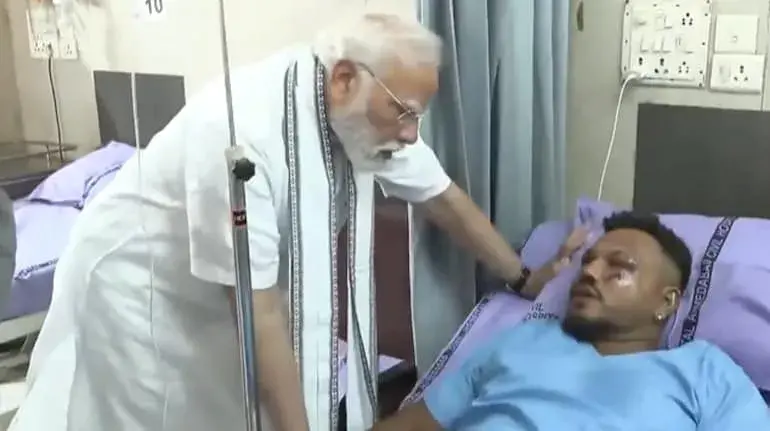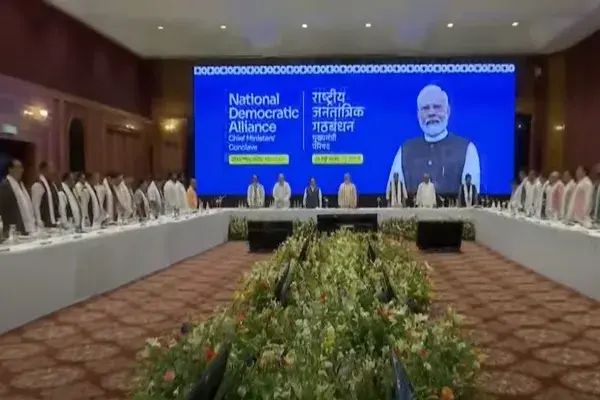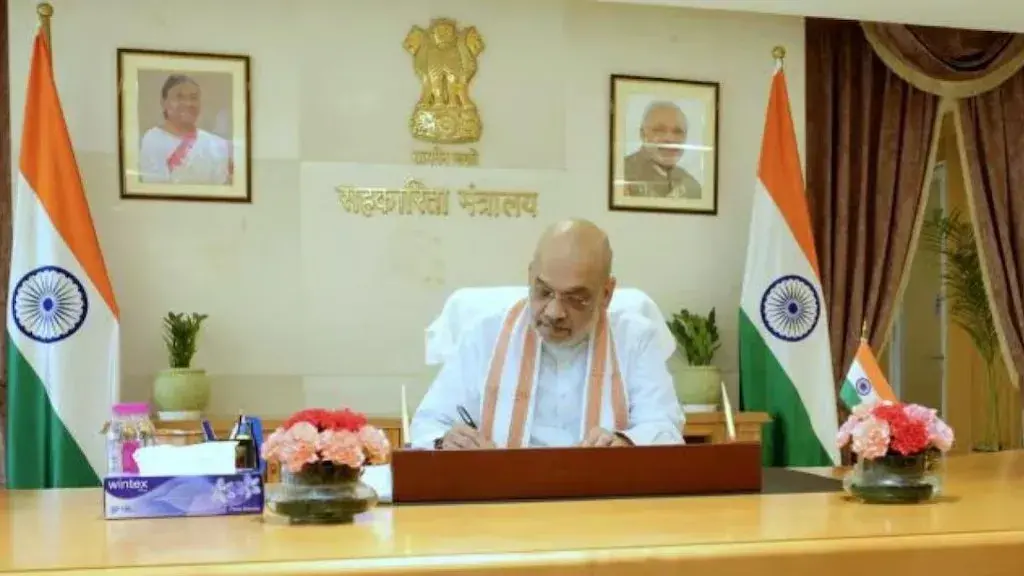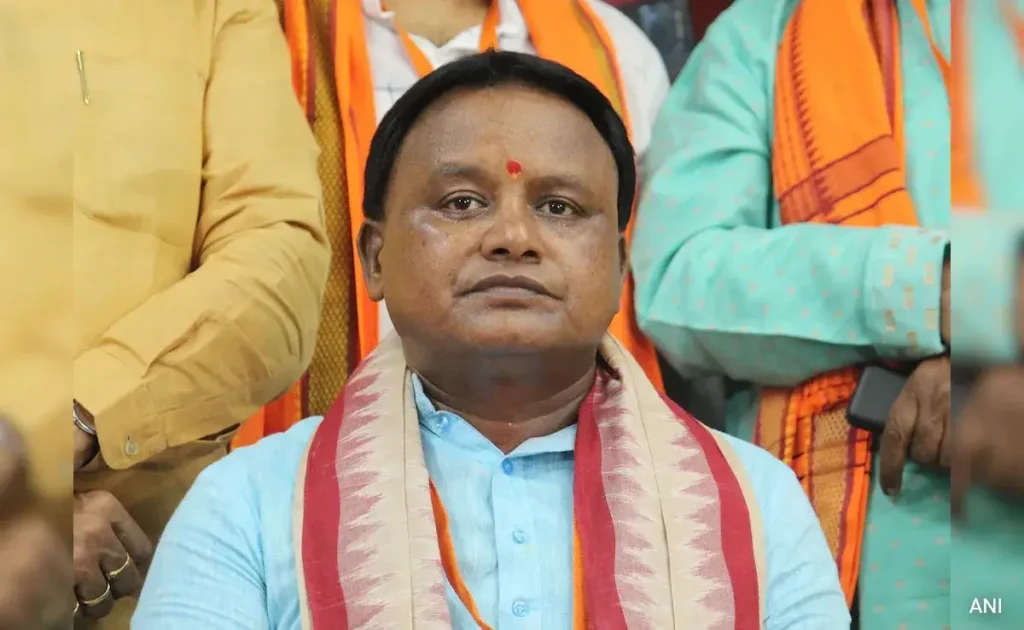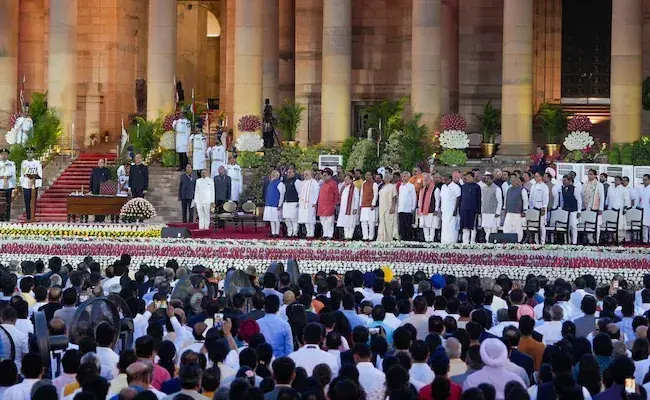The new council of ministers led by Prime Minister Narendra Modi includes 61 members from the Bharatiya Janata Party (BJP) and 11 leaders from the National Democratic Alliance (NDA) allies. Of the 72 ministers, 43 have served three or more terms in Parliament, and 39 were ministers in the previous Union government. Full List of Ministries and Ministers in Modi 3.0 Government Here is a look at the top ministers and the portfolios they held in the previous Narendra Modi-led government: Prime Minister Narendra Modi Portfolios: Ministry of Personnel, Public Grievances and Pensions, Department of Atomic Energy, Department of Space, all important policy issues, and portfolios not allocated to any minister Ministry of Home Affairs Union Minister: Amit Shah Ministers of State: Nityanand Rai, Bandi Sanjay Kumar Ministry of Cooperation Union Minister: Amit Shah Ministers of State: Krishan Pal, Murlidhar Mohol Ministry of Defence Union Minister: Rajnath Singh Minister of State: Sanjay Seth Ministry of External Affairs Union Minister: S Jaishankar Ministers of State: Kirtivardhan Singh, Pabitra Margherita Ministry of Finance Union Minister: Nirmala Sitharaman Minister of State: Pankaj Chaudhary Ministry of Corporate Affairs Union Minister: Nirmala Sitharaman Minister of State: Harsh Malhotra Ministry of Road Transport and Highways Union Minister: Nitin Gadkari Ministers of State: Ajay Tamta, Harsh Malhotra Ministry of Health and Family Welfare Union Minister: JP Nadda Ministers of State: Anupriya Patel, Prataprao Ganpatrao Jadhav Ministry of Chemicals and Fertilisers Union Minister: JP Nadda Minister of State: Anupriya Patel Ministry of Youth Affairs and Sports Union Minister: Mansukh Mandaviya Minister of State: Raksha Nikhil Khadse Ministry of Labour and Employment Union Minister: Mansukh Mandaviya Minister of State: Shobha Karandlaje Ministry of Food Processing Industries Union Minister: Chirag Paswan Minister of State: Ravneet Singh Ministry of Agriculture and Farmers Welfare Union Minister: Shivraj Singh Chouhan Ministers of State: Ram Nath Thakur, Bhagirath Choudhary Ministry of Rural Development Union Minister: Shivraj Singh Chouhan Ministers of State: Dr. Chandra Shekhar Pemmasani, Kamlesh Paswan Ministry of Power Union Minister: Manohar Lal Khattar Minister of State: Shripad Naik Ministry of Housing and Urban Affairs Union Minister: Manohar Lal Khattar Minister of State: Tokhan Sahu Ministry of Tourism Union Minister: Gajendra Singh Shekhawat Minister of State: Suresh Gopi Ministry of Culture Union Minister: Gajendra Singh Shekhawat Minister of State: Rao Inderjit Singh Ministry of Information and Broadcasting Union Minister: Ashwini Vaishnaw Minister of State: L Murugan Ministry of Railways Union Minister: Ashwini Vaishnaw Ministers of State: Ravneet Singh, V Somanna Ministry of Electronics and Information Technology Union Minister: Ashwini Vaishnaw Minister of State: Jitin Prasada Ministry of Civil Aviation Union Ministers: Kinjarapu Rammohan Naidu, Murlidhar Mohol Ministry of Education Union Minister: Dharmendra Pradhan Ministers of State: Sukanta Majumdar, Jayant Chaudhary Ministry of Women and Child Development Union Minister: Annapurna Devi Minister of State: Savitri Thakur Ministry of Environment, Forest and Climate Change Union Minister: Bhupendra Yadav Minister of State: Kirtivardhan Singh Ministry of Jal Shakti Union Minister: CR Paatil Ministers of State: V Somanna, Raj Bhushan Choudhary Ministry of Parliamentary Affairs Union Minister: Kiren Rijiju Ministers of State: L Murugan, Arjun Ram Meghwal Ministry of Minority Affairs Union Minister: Kiren Rijiju Minister of State: George Kurian Ministry of Heavy Industries Union Minister: HD Kumaraswamy Minister of State: Bhupathi Raju Srinivasa Varma Ministry of Steel Union Minister: HD Kumaraswamy Minister of State: Bhupathi Raju Srinivasa Varma Ministry of Communication Union Minister: Jyotiraditya Scindia Minister of State: Dr. Chandra Shekhar Pemmasani Ministry of Development of North Eastern Region Union Minister: Jyotiraditya Scindia Minister of State: Sukanta Majumdar Ministry of Textiles Union Minister: Giriraj Singh Minister of State: Pabitra Margherita Ministry of Consumer Affairs, Food and Public Distribution Union Minister: Prahlad Joshi Ministers of State: BL Verma, Nimuben Jayantibhai Bambhaniya Ministry of New and Renewable Energy Union Minister: Prahlad Joshi Minister of State: Shripad Naik Ministry of Petroleum and Natural Gas Union Minister: Hardeep Singh Puri Minister of State: Suresh Gopi Ministry of Micro, Small and Medium Enterprises Union Minister: Jitan Ram Manjhi Minister of State: Shobha Karandlaje Ministry of Panchayati Raj Union Minister: Lallan Singh Minister of State: SP Singh Baghel Ministry of Fisheries, Animal Husbandry and Dairying Union Minister: Lallan Singh Ministers of State: SP Singh Baghel, George Kurian Ministry of Commerce and Industry Union Minister: Piyush Goyal Minister of State: Jitin Prasada Ministry of Ports, Shipping and Waterways Union Minister: Sarbananda Sonowal Minister of State: Shantanu Thakur Ministry of Social Justice and Empowerment Union Minister: Dr. Virendra Kumar Ministers of State: Ramdas Athawale, BL Verma Ministry of Tribal Affairs Union Minister: Jual Oram Minister of State: Durgadas Uikey Ministry of Coal Union Minister: G Kishan Reddy Minister of State: Satish Chandra Dubey Ministry of Mines Union Minister: G Kishan Reddy Minister of State: Satish Chandra Dubey Ministers of State (Independent Charge) Rao Inderjit Singh: Ministry of Statistics and Programme Implementation, Ministry of Planning, Ministry of Culture Dr. Jitendra Singh: Ministry of Science and Technology, Ministry of Earth Sciences, Minister of State in the Ministry of Personnel, Public Grievances and Pensions, Department of Atomic Energy, Department of Space Arjun Ram Meghwal: Ministry of Law and Justice Prataprao Ganpatrao Jadhav: Ministry of Ayush

